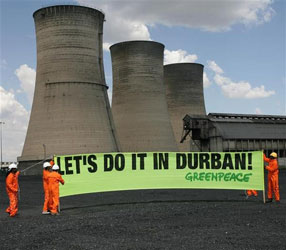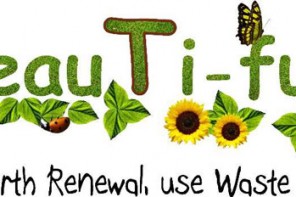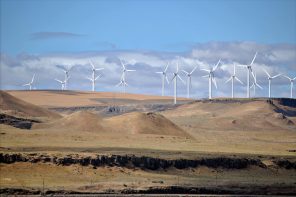On 30 September 2011, International Relations Minister Maite Nkoana-Mashabane confirmed that South Africa will be ready to host the hotly contested United Nations climate change conference, the COP17 in Durban from 28 November to 9 December 2011. Many interested parties will descend on Durban to participate in finding a solution to curbing the effects of climate change and negotiate a deal that the various countries can commit to.
“Climate talks have already failed” – Earthlife
However, some activists are not positive that the talk will deliver any substantial outcome. According to Muna Lakhani, Earth Life Cape Town branch coordinator, the talks have already failed. “We’re of the opinion that COP 17 has already failed. If you consider what’s been happening in the talks in the run-up to, which is pretty much where most of the work happens, the most that’s going to come out of it is some global environmental fund or facility which, quite frankly, is generally going to be a bad idea,” said Lakhani.
However not all environmental agencies share this pessimistic outlook. Tim Gore, climate change adviser with aid group Oxfam expressed his satisfaction that a draft text on long-term finance was released on 7 October, which experts believe will guide developed nations toward identifying capital for the empty Green Climate Fund in Durban. The Fund was set up in 2010 at the Cancun talk, in which governments agreed to set up a Green Climate Fund to manage an annual $100 billion by 2020 for developing countries to aid them in addressing climate change.
“A great deal can be made” – Greenpeace
Greenpeace, an international environmental watchdog and lobby group welcomed Durban as the host city for the Climate Conference. “A great deal for the climate can be made in Durban next year, provided that South Africa seizes the opportunity to become a leader and take responsibility for being the largest emitter on the African continent,” said Michelle Ndiaye Ntab, Executive Driector for Greenpace Africa. However Greenpeace also called on South Africa to allow “ample room” for protest at the next round of UN climate talks.
People should be allowed to protest
Environmental groups and activists have been known to protest and demonstrate at climate change negotiations. In 2009, 11 Greenpeace activists gate-crashed a royal gala at the climate change talks in Copenhagen. The activists disguised themselves as guests, before urfurling banners that read “Politicians Talk, Leaders ACT”. The activists were arrested and received two-week suspended prison sentences.
Ahead of the event in Durban, Greenpeace released a statement urging the South African government to respect people’s freedom of expression. “Greenpeace Africa urges South Africa’s government to allow ample room for freedom of expression during the international climate negotiations taking place in Durban later this year.”
“South Africa has the responsibility to listen to the people who are calling for a better and cleaner future for all, and make the right decisions both internationally and domestically,” said Greenpeace Africa climate campaigner Ferrial Adam.
Durban event to meet international standards
South Africa’s International Relations Minister is confident that South Africa and Durban will be able to pull off a successful and secure COP17 conference that meets United Nations and International standards. “We are working closely with the city of Durban and the United Nations Framework Convention on Climate Change to ensure that we host an International event that meets UN requirements,” Maite Nkoana-Mashabane stated.
Nkoana-Mashabane also reiterated at an earlier opportunity at the 50-day countdown to the conference in Soshanguve near Pretoria that “Ordinary people that suffer daily from the impacts of climate change…have high expectations from their leaders,” said Nkoana-Mashabana before adding that COP17 will not be an easy meeting.
“We have appealed to parties to arrive at COP17 with the willingness to compromise and yield from their current positions.Otherwise there could be a breakdown in negotiation with serious ramifications of achieving progress on climate change through a multilateral approach,” Nkoana-Mashabane said.
South Africa’s perspective
The South African Department of Environmental Affairs believes that in order for the Durban talks to be a success, the need for a balance to be struck along three areas of work in the negotiation is crucial:
- A balance between operationalizing decisions made thus far in the negotiation and pending issues
- A balance between the outcomes under both the Convention and the Kyoto Protocol
- A comprehensive balanced advancement of all elements that will make up the future climate change regime
There are fears that talks at the COP17 could be overshadowed by statistics which indicates that the world’s carbon dioxide emissions hit their highest level yet in 2010, which is driven primarily by booming coal-reliant emerging economies such as China. At the same time, the risk of yet another global economic slowdown has contributed to divert public attention and served to make governments even more conservative where spending is concerned.
Christina Figueres, United Nations Framework Convention on Climate Change perhaps sums it up best: “It is the responsibility of every single actor and human being. Everyone needs to accept their responsibility – the private sector, civil society, NGOs, national governments and individuals – and to contribute to the solution,” said Figueres.











